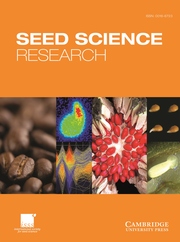Article contents
Seed germination and longevity of autumn-flowering and autumn-seed producing Mediterranean geophytes
Published online by Cambridge University Press: 05 September 2012
Abstract
The seasonality of the Mediterranean climate has important implications for plant physiology and some specific conditions must be met before germination can occur. Most plants sprout during the spring season although a few germinate during the autumnal rainy period. To understand the patterns of germination under autumn conditions we selected five Mediterranean autumn-flowering geophytes that usually co-exist in fire-prone habitats: Leucojum autumnale, Narcissus cavanillesii, Narcissus serotinus, Scilla autumnalis and Urginea maritima. Experiments were performed under conditions simulating those prevailing in the habitat during the autumnal Mediterranean season when seeds of these species usually germinate. In all species, germination occurred quickly ( < 7 d), was usually higher at the lowest temperatures tested (15°C, 20°C; >89%) and no signs of delayed germination were detected. Nevertheless, species usually had different patterns of seed germination, a strategy that might avoid interspecific competition when co-occurring in the same habitats. Germination was lower and slower in light than in darkness, suggesting that under natural conditions germination of seeds directly exposed to sunlight can be severely restricted. Several fire-dependent treatments (heat and ash) revealed a lack of fire-stimulated germination, and treatments even had a negative effect. In addition, only a small fraction of seeds remained viable after 1 year of dry lab storage and their germinability was very low, suggesting the absence of a permanent soil seed bank in the life cycle of these geophyes.
Keywords
Information
- Type
- Research Papers
- Information
- Copyright
- Copyright © Cambridge University Press 2012
References
- 11
- Cited by

